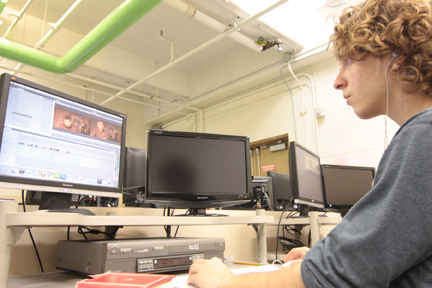City College students present the ‘reel’ deal for film festival

By Catherine Lee
The Guardsman
Take a group of ardent filmmakers, a region drenched with cinephiles, festival-savvy faculty and an affordable film school, and you get a premium film festival packed with the unique flavor and spice of City College.
“City Shorts” presents Bay Area, locally grown films on the Ocean campus May 19 and later in the year at the Roxie Theater. Films are generally ten minutes or less and were produced within the last two semesters in the City College cinema department.
“It’s a unique festival because it’s seriously designed and developed as a film festival, rather than as a courtesy event for student films,” filmmaker Charles Chadwick said.
If this year is anything like last year, over 100 entries will be submitted. The entries will be distilled down to the best pieces and screened as a two-hour program at the Diego Rivera Theatre.
Students submit work in one of three categories – narrative, documentary and experimental. Final festival programming represents the best of the entries, taking editing, sound design, animation, special effects and original score into consideration.
“I see more experimental and new ideas in the City College student work than in many film festivals,” said cinema professor Lise Swenson , an independent filmmaker who has screened in prestigious festivals, including the Sundance Film Festival in Colorado.
The winning films are not announced until a few days prior to the festival, so it’s impossible to say which films or students made the final cut.
“The diversity of the classes and students at City College is amazing, and the students in the film program come from a huge range of backgrounds and talent,” Swenson said. “Students here have a sense of awe and privilege that’s not typical of all higher education students in film departments.”
A class project
Cinema 40, taught by Swenson, demonstrates the creation and execution of a film festival. Essentially, the festival is the course’s final project.
Students divide into three committees at the beginning of the semester – events, marketing and public relations, and selection. They can repeat the class to fulfill each area.
The festival spokeswoman in the marketing group, Shannon Fischer, said the theme for the festival, “Catch the Fire,” represents the “fire in the eyes that is a filmmaker’s vision, but the theme doesn’t reflect how the films are selected.”
Film submissions are initially screened and juried by all Cinema 40 students. They then forward the top 25 percent of the films to a three-judge panel that is composed of one faculty member and two industry/festival professionals from the Bay Area filmmaker community.
This year’s faculty judge is San Francisco Film Commissioner and City College instructor Debbie Brubaker.
Professional peer participation by someone with Brubaker’s prestige brings a lot of cachet to the festival and adds local artists’ support, Swenson said.
Because the Bay Area has an exuberant film community that regularly attends the festival, it is a great launching pad for new filmmakers to be seen by local professionals, Swenson added.
Real life impact
The energy of the Cinema 40 class and film festival extends to all endeavors, students said.
Mark Pope’s short “Gold Violin: Bow of Death” was a small project undertaken last fall in his cinema production class. Pope submitted the short film for this year’s City College festival.
“The film festival class helped me prepare for what to do once I got my film into the festival,” Pope said.
He recently won awards in a community college film festival hosted by Palomar Community College in San Marcos, Calif.
Pope’s 8-minute documentary won in the music and variety category. In addition, it has been accepted at the Mendocino Film Festival in the short documentary category.
Even students from traditional, more expensive film schools benefit from the practical and networking benefits of the film festival class.
This spring, filmmaker Charles Chadwick will graduate with a masters in film from the prestigious San Francisco Art Institute.
“It’s not just people taking the class to get a grade, and everyone is very professional,” Chadwick said. “There’s so much more freedom, and filmmakers get hands-on experience very quickly here because the prerequisites are minimal.”
Email:
clee@theguardsman.com

Comments are closed.